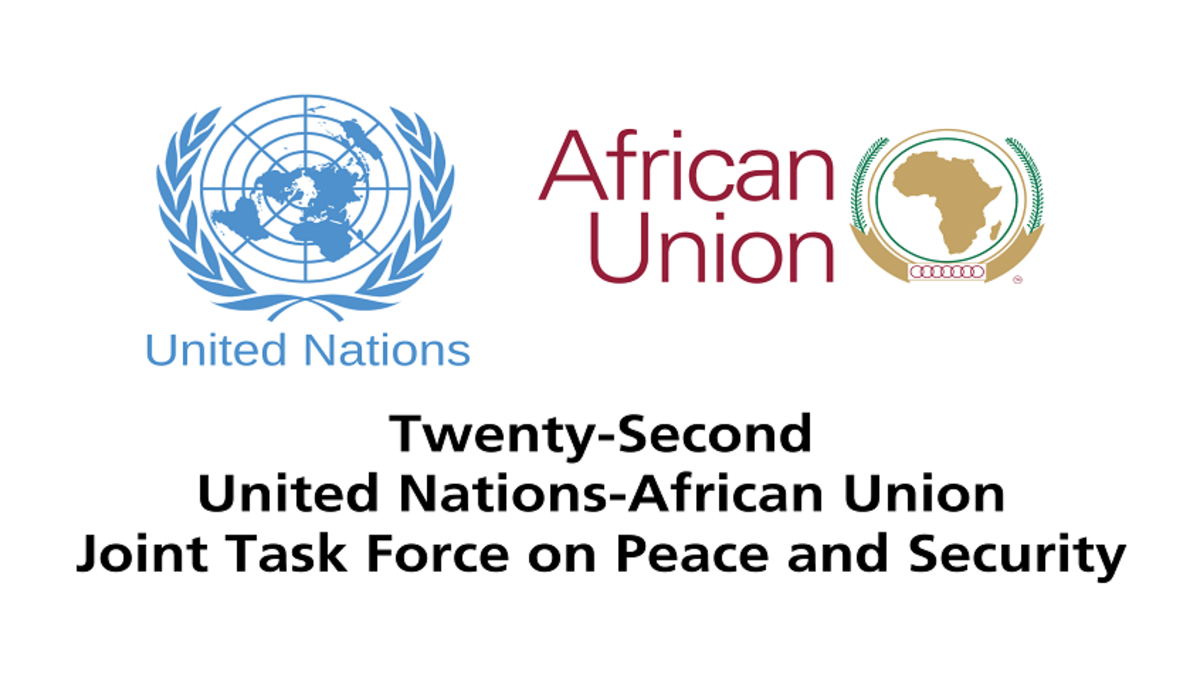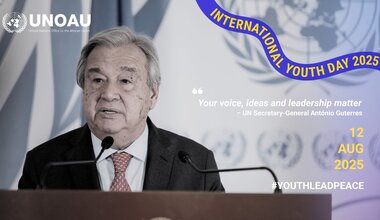Joint Communiqué | UN-AU Joint Task Force on Peace and Security Holds Twenty-Second Consultative Meeting
New York, 18 September— The United Nations-African Union Joint Task Force on Peace and Security held its twenty second consultative meeting on 18 September 2023 in New York.
The meeting reviewed the status of the partnership between the United Nations (UN) and the African Union (AU) with an update on the implementation of the Joint UN-AU Framework for Enhanced Partnership in Peace and Security. In this context, the meeting discussed peace and security developments in the Democratic Republic of the Congo (DRC), Somalia, the Sudan and Central African Republic and Gabon, as well as discussions on unconstitutional changes of Governments in the Sahel region.
The AU Commission and the UN Secretariat were represented respectively by Commissioner Bankole Adeoye (Political Affairs, Peace and Security); and the Under-Secretaries-General Rosemary DiCarlo (Political and Peacebuilding Affairs), Jean-Pierre Lacroix (Peace Operations), Atul Khare (Operational Support), Parfait Onanga-Anyanga, Special Representative of the Secretary-General to the African Union and Assistant Secretary-General Martha Pobee (Africa). The meeting was also attended by other senior officials from the two Organizations.
The Joint Task Force took note of the considerable progress achieved in the UN-AU partnership including with Regional Economic Communities and Mechanisms in Africa, together with international partners. These include sustained collaboration on support to AU peace support operations, early warning, prevention initiatives and coordinated support to national authorities for the conduct of timely, peaceful, and inclusive elections, as well as for the promotion and protection of human rights. The meeting discussed the need for sustainable financing of Security Council-mandated AU-led peace support operations.
The meeting expressed concerns on the resurgence of Coup d’Etats and military takeovers on the Continent. The Joint Task Force welcomed efforts to deepen collaboration on operational support matters, including through the exchange of knowledge and expertise, and acknowledged the positive impact on mandate implementation in various operational contexts. Both Organizations emphasized the need to strength collaboration in mediation support and focusing more on their joint initiatives on the women, peace and security, and youth for peace and security agendas.
On Burkina Faso, Guinea and Mali, the Joint Task Force reiterated the African Union and United Nations’ commitment to support transitional authorities towards the return to constitutional order, in coordination with the Economic Community of West African States (ECOWAS). The Joint Task Force strongly encouraged the transitional authorities and national stakeholders to pursue efforts towards peaceful and inclusive transitions respectful of human rights. The meeting also reiterated support for the efforts of ECOWAS to ensure restoration of constitutional order and a peaceful resolution to the crisis in Niger.
With regard to the Democratic Republic of the Congo, the Joint Task Force expressed deep concern over the deteriorating security situation in Ituri and North Kivu, which continues to affect the lives of thousands of civilians, mostly women and children, and worsen the already dire humanitarian situation.
The meeting urged all armed groups to disarm unconditionally and join the Disarmament, Demobilization, Community recovery and Stabilization Programme (PDDRCS) or return to their countries of origin, as appropriate. The meeting reaffirmed the continued support of the United Nations and the African Union to regional peace initiatives for the DRC, namely the Nairobi and Luanda processes.
The African Union reaffirmed its commitment to lead efforts of the Multilevel Coordination Working Group on coordination and harmonization of regional peace initiatives, established during the 27 June 2023 Quadripartite Summit, with the support of the UN and other key stakeholders. The meeting reiterated the importance of revitalizing the Peace, Security and Cooperation Framework for the DRC and the region.
Regarding Somalia, the Joint Task Force highlighted the strong partnership between the AU and UN in Somalia and the need for continued close cooperation to ensure support for Somalia in advancing state building priorities and in the security transition.
On Sudan, the Joint Task Force expressed grave concern about the escalation of violence in the Sudan, including the increasing intercommunal tensions and ethnicization of the fighting in Darfur. The JTF called on the warring parties and non-state armed actors to uphold their obligations under international humanitarian law and human rights law to refrain from attacks against civilians and civilian objects, and to respect the right to life. The meeting stressed the importance of reaching swiftly a permanent ceasefire, to be followed by an inclusive, peaceful and lasting solution to the crisis. Noting that the unity and preservation of the Sudanese state and the stability of the region are at stake, the Joint Task Force welcomed the efforts of the AU and the Intergovernmental Authority on Development (IGAD) to ensure a strong and well-coordinated international support for a sustainable resolution of the conflict and for the transition to a fully civilian, credible, democratic government.
The next statutory meeting of the Joint Task Force will be hosted by the African Union Commission at a date to be convened by both Organizations.
 UN
UN






